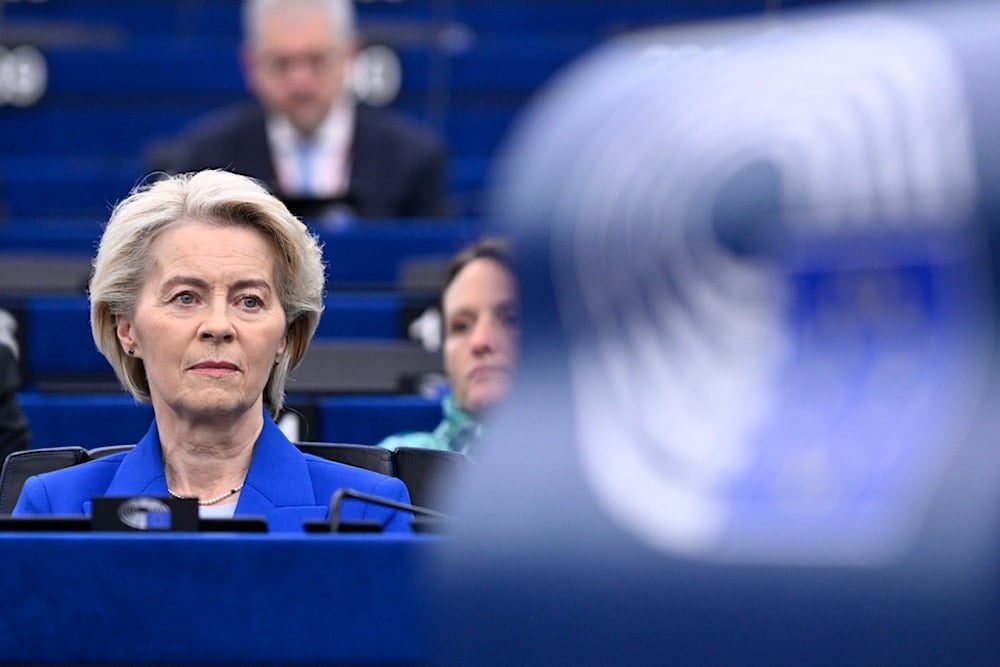European Commission's von der Leyen survives twin no-confidence votes
European Commission President Ursula von der Leyen has survived two no-confidence votes led by far-right and far-left lawmakers over her trade policies.
-

European Commission president Ursula von der Leyen sits during statements on EU response to alleged Russian violations of the EU Member States' airspace and critical infrastructure, Wednesday, Oct. 8, 2025, at the European Parliament in Strasbourg, eastern France (AP)
European Commission President Ursula von der Leyen successfully staved off two no-confidence motions on Thursday, as the European Parliament rejected efforts from both hard-right and far-left groups to remove her from office.
In the sessions, 378 lawmakers opposed the first motion and 383 opposed the second, solidifying her grip on the executive branch despite signs of internal restlessness. The result marked a modest improvement from a similar attempt in July, when she earned 360 protective votes, though both tallies still fell short of the 401 votes she received for her reappointment in 2024.
Shortly after the votes, von der Leyen took to X to express her thanks. She said she "deeply appreciated" Parliament's backing and pledged that her team of commissioners would work closely with the parliament to tackle Europe's challenges ahead.
I deeply appreciate the strong support received today.
— Ursula von der Leyen (@vonderleyen) October 9, 2025
The Commission will keep working closely with the European Parliament to tackle Europe's challenges. And together deliver results for all European citizens.
United for our people, our values and our future.
Growing polarization in Brussels
While neither motion stood a realistic chance of reaching the two-thirds supermajority required to oust the Commission, their very existence underscored widening ideological rifts in the European Parliament. Analysts point to the 2024 elections, which expanded the far-right's representation to more than 100 seats, enabling fringe groups to wield greater procedural power. Under parliamentary rules, only 72 MEPs are needed to trigger a censure motion.
Both motions centered on von der Leyen's trade policy, denouncing her for what opponents called an "unbalanced" US tariff deal and for advancing a free trade pact with the Mercosur bloc. Critics argue that the Mercosur accord could harm EU farmers and weaken environmental standards, particularly in the Amazon region.
Trade tensions fuel political backlash
The EU-US trade agreement, signed in late July, imposes a 15% tariff on most European exports to the US. In return, the EU agreed to purchase $750 billion worth of US energy and invest $600 billion into the US economy by 2028.
The deal sparked swift and vocal opposition across Europe. French Prime Minister François Bayrou described it as "a dark day," while German Chancellor Friedrich Merz warned it could inflict "considerable damage" on the German economy and European competitiveness. The agreement is widely seen as an attempt to reset transatlantic trade relations after years of friction, but has inflamed concerns that Brussels conceded too much to Washington.
Read more: US-EU trade deal draws EU criticism over inequality, subjugation
Next steps for the EU executive
Both the US tariff deal and the Mercosur trade agreement are expected to face formal parliamentary votes in the coming months, setting the stage for what could become defining tests of von der Leyen's leadership.
For now, her political standing appears secure. But Thursday's votes laid bare a fractured and increasingly contentious European Parliament, where once-stable centrist coalitions are struggling to maintain control amid rising populist pressure and growing resistance to Brussels' trade and environmental agenda.

 3 Min Read
3 Min Read










